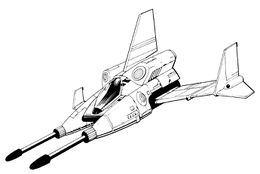Sparrowhawk

| |
| Sparrowhawk | |
| Production information | |
| Manufacturer | Warner Incorporated |
| Model | SPR-H5 |
| Class | Light |
| Tech Base | Inner Sphere |
| Technical specifications | |
| Mass | 30 tons |
| Structural Integrity | 10 |
| Frame | StarTech Mod II |
| Power Plant | Warner 240J |
| Fuel | 400 - 5 tons |
| Armament |
2 x Medium Lasers |
| Communications System | Rander 100 |
| Tracking & Targeting System | Rander TA4 |
| Heat Sinks | 10 (single) |
| BV (1.0) | 634 |
| BV (2.0) | 637 |
Description
The Sparrowhawk was designed and debuted in 2520 as a fighter escort for larger attack craft (heavy ASFs, assault DropShips, etc.). The high rate of thrust also allows it to be a superb first-response unit. The craft has a unique armor ejection system installed, so that the pilot may manually release the damaged armor if it would hinder atmospheric re-entry. The Rander 100 communications system is considered one of the most reliable in any ASF.
Armament
The Sparrowhawk is limited to laser weaponry, which is just fine if you need to fend off an invasion force and need the lengthened combat time. The primary system, two Martell Medium Lasers, are nose-mounted, increasing the pilot's accuracy for both medium- and short-range attacks, while the two Exostar Small Lasers' position in the wings suffer easily when the fire control system drops off due to damage.
Variants
- SPR-8H - This Davion variant (introduced in 2906) replaces both Medium Lasers and one Small Laser with one Holly SRM-2 rack and ammunition space. Due to its unpopularity, it is only seen (rarely) in the Capellan March Militia. BV (1.0) = 452, BV (2.0) = 466
- SPR-H5K - This Kuritan variant (introduced in 3018) removes both Medium Lasers and replaces them with another four Small Lasers, mounted in the nose & fuselage. This increases the rate of firepower, but the targeting system, which was not matched, can be easily overtaxed. BV (1.0) = 505, BV (1.0) = 508
- SPR-6D - Introduced in 3051, this Star League-level variant swaps each of the original lasers with pulse versions, increasing its combat capability by over 7%. BV (1.0) = 680, BV (2.0) = 729


